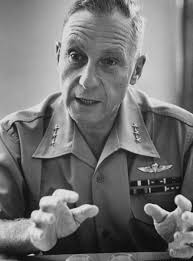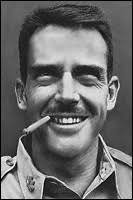General Krulak and JFK

Marine Gen. Victor H. Krulak
Marine Gen. Victor H. Krulak
Colonel Walter M. Higgins, Jr. wrote the memo of
the minutes of the September 25, 1963 meeting of the Joint Chiefs of Staff that
detailed the briefing Desmond FitzGerald gave on CIA Cuban operations and
planning, including the study of the July 20, 1944 plot to kill Hitler to be
used against Castro.
Higgins wrote that FitzGerald “felt that there had been great success
in getting closer to the military personnel who might break with Castro, and
stated that there were at least ten high-level military personnel who are
talking with CIA but as yet are not talking to each other, since that degree of
confidence has not yet developed. He considers it as a parallel in history;
i.e., the plot to kill Hitler; and this plot is being studied in detail to
develop an approach.”
Higgins worked for the Special Assistant for
Counterinsurgency and Special Activities (SACSA) under General Victor
"Brute" Krulak, one of the most decorated Marines and combat hero of
three wars, World War II, Korea and Vietnam.
In the South Pacific, Krulak allegedly crossed
paths with JFK when the PT boat skipper took 50 of Krulak's marines off an
island under fire, and one of the marines died in JFK's bunk, prompting Krulak,
as the legend goes, to promise JFK a bottle of Three Feathers whiskey.
As chief of SACSA, Krulak reported directly to the
Secretary of Defense, and often briefed the President on his specialty - counter
insurgency warfare, but his focus was on Vietnam, not Cuba, which was something
of a CiA side show that the military assisted the CIA with supplies and
training.
Krulak used to tell the story of how once, late in
the day, he visited JFK in the Oval Office, delivering the bottle of Three
Feathers whiskey he had promised him nineteen years earlier for taking his men
off that island in the South Pacific. Krulak said that they reminisced about the
war and the marine who died in JFK’s PT boat bunk while drinking whiskey.
According to biographer Robert Coram, (“Brute – The
Life of Victor Krulak, U.S. Marine, Little, Brown, 2010), “Over the years there
would be many stories about how Krulak went from San Diego back to Washington.
The true story is that JFK read General Maxwell Taylor’s “The Uncertain
Triumph,” which convinced him to move away from Eisenhower’s nuclear doctrine
of massive retaliation and instead to embrace the concept of smaller wars.
Kennedy urged the military to place far more emphasis on counterinsurgency as a
way to handle what was becoming a growing problem in Vietnam and in other
locations around the world….To sidetrack Kennedy’s ideas – not to implement
them – the Joint Chiefs of Staff came up with a new job, special assistant for
counterinsurgency and special activities – SACSA,…and be among those who met
regularly with the president.”
Krulak had successfully developed the use of the helicopter
in combat in Korea, delivering troops and supplies and evacuating the dead and
wounded and he envisioned their use in combat in Vietnam, where counter
insurgency meant not only defeating the enemy on the battlefield, but
"winning the hearts and minds of the people."
As his biographer put it: “Reduced to basics,
Krulak’s job was to develop America’s techniques for fighting a counterinsurgency
war in Vietnam and to develop programs that would enable JFK to measure America’s
progress and the progress of South Vietnam as an ally. To do this, Krulak had
to push not only the reluctant American military and the slow-moving State
Department but also the American people to undergo a radical shift in their
thinking about the war. This war was not about taking the hill…”
Krulak is quoted as saying, “Protection is the most
important thing you can bring. After that comes health. And after that, many
things – land, prosperity, education, and privacy to name a few.”
According to Coram, “In the counterinsurgency part
of his White House job, Krulak was an abject failure. He never got across to
the American military or the American people what a war of national liberation was
all about, what the Vietnam War meant to the United States, and why America had
a stake in Southeast Asia. One reason he failed was that the government itself
did not understand these issues.”
“During
these meetings, Krulak was duel-hatted. As the special assistant for counterinsurgency,
he was the government’s top expert on counterinsurgency matters. As the special
assistant for special activities, he held one of the most sensitive jobs in the
U.S. government: liaison between the military and the CIA. This was the blackest
of the black holes and involved some of the most highly classified matters of
national defense. It meant that in Vietnam (and Cuba), Krulak was in charge of
psychological warfare and covert activities against the enemy, a job that in a
few years would be turned over to a much larger group with the innocuous name
Studies and Observation Group (SOG).”
After one briefing where there were reports of
large desertions by South Vietnamese regular army troops, JFK sent Krulak and a
mid-level State department officer, both going in different directions when they
got there, with Krulak flying by helicopter to remote military bases
close to the combat. When they returned and gave such disparate reports, JFK
asked if they went to the same country.
“The arcane, secretive, and highly sensitive
practice of ‘disinformation’ was Krulak’s responsibility during the Cuban
Missile Crisis of October 1962. Even today it is difficult to sort out what was
real and what was a ruse during those days when the world came close to nuclear
war. And despite a host of books about the crisis, the CIA, and clandestine
operations, it is difficult to know exactly which of the black arts Krulak was
practicing. That he was involved is made clear in several books. But doing
what? Dis the war planes being moved to Georgia and Florida herald an attack on
Cuba, or were they a diversion? Was there really a host of American submarines
in Cuban waters, or was that a rumor designed to pull the Cuban navy offshore?”
Krulak, it appears, could have been like the Marine
hero of “Seven Days in May,” played in the movie by Kurt Douglas, a mid-level
officer who picked up on the coup d'etat the Joint Chiefs of Staff were
planning, and warned the president, except Krulak apparently wasn't paying
close attention to the Cuban affairs, where the coup plans to be used against
JFK were brewing.
“According to the White House visitor log, his
first one-on-one meeting with Kennedy came on August 21, 1963. Between then and
November 1, he had ten private meetings with the president, which lasted
anywhere from twenty minutes to more than two hours. The subject of most of
those meetings is listed simply as ‘Vietnam.’ No topic is listed for others.”
Colonel Fletcher Prouty (USAF) was the first to
call attention to Krulak and the SACSA office in the Pentagon was just down the
hall from Prouty and the ACSI – Assistant Chief of Staff for Intelligence (US
Army Reserves) - the intelligence unit that was keeping tabs on what was going
on in Dallas.
After the death of the President Prouty sent Krulak
a photo of a man in suit and tie walking past the Texas School Book Depository
on the day of the assassination, asking if he recognized the person, to which
Krulak replied that it sure did look like their old friend Gen. Lansdale, who
like Krulak, specialized in covert ops, counter-insurgency and psychological
warfare in Cuba and Vietnam.
John Newman traced Lansdale's movements and learned
Lansdale was in Fort Worth that morning, possibly in the same hotel JFK and LBJ
stayed that night.
Was Lansdale in Dallas that day? Both Prouty and
Krulak thought so.
While Krulak was preoccupied with Vietnam, Cuba was
the subject that comes into play in regards to the assassination, and the
Higgins memo, besides calling attention to the CIA’s study of the July 20, 1944
assassination attempt on Hitler, and its adaption to use against Castro, there
are other bullet point issues that come into play.
Other issues in the Higgins Memo – that was written
for General Krulak by his assistant concerning communications, planning, security
and a letter that was so secret it could only be read and returned to sender:
14. General LeMay then questioned the advisability of utilizing a
communication technique to install a radio capability which would permit
break-in on Castro broadcasts. He stated that an Air Force officer named
McElroy was available to talk to Mr. FitzGerald on the matter, and Mr.
FitzGerald accepted this offer.
• 15. The conference closed with General LeMay directing that Mr. FitzGerald's planners meet with General Krulak's people and work out the details as to how the military can assist in supporting these operations. After Mr. FitzGerald departed, General LeMay gave added directions to Colonel Higgins to initiate necessary steps for planning.
• 16. After the JCS meeting Admiral Riley called Colonel Higgins into his office and read a letter from Mr. McGeorge Bundy which discussed secrecy measures necessary related to CubaCIA operations. Admiral Riley directed Colonel Higgins to have the nature of
this letter put out through SACSA control to SACSA contact points to insure an
adequate system for secrecy within the military services. Admiral Riley stated
he was returning the letter to Mr. Gilpatric as he did not want written
communication by SACSA, but to put this out orally. This was transmitted to
Colonel Wyman who will take the action to prepare an appropriate memorandum for
the record to be filed with General Ingelido in accordance with further
direction by Admiral Riley.
• 17. General Wheeler, Chief of Staff of the Army, called and questioned us concerning SACSA's access for the knowledge of such operations as mentioned in the McGeorge Bundy letter. I advised him that our Pendulum system was in being but that I would look into it in greater detail to determine that it met the letter as well as the spirit of the memorandum. I stated I believed this was so but had not had reason to do it until this date and therefore did not give him a positive answer at that time.



• 15. The conference closed with General LeMay directing that Mr. FitzGerald's planners meet with General Krulak's people and work out the details as to how the military can assist in supporting these operations. After Mr. FitzGerald departed, General LeMay gave added directions to Colonel Higgins to initiate necessary steps for planning.
• 16. After the JCS meeting Admiral Riley called Colonel Higgins into his office and read a letter from Mr. McGeorge Bundy which discussed secrecy measures necessary related to Cuba
• 17. General Wheeler, Chief of Staff of the Army, called and questioned us concerning SACSA's access for the knowledge of such operations as mentioned in the McGeorge Bundy letter. I advised him that our Pendulum system was in being but that I would look into it in greater detail to determine that it met the letter as well as the spirit of the memorandum. I stated I believed this was so but had not had reason to do it until this date and therefore did not give him a positive answer at that time.
No comments:
Post a Comment